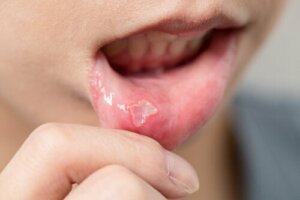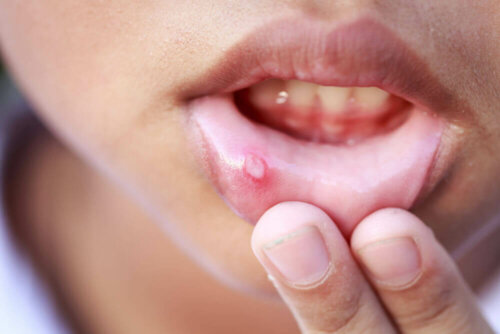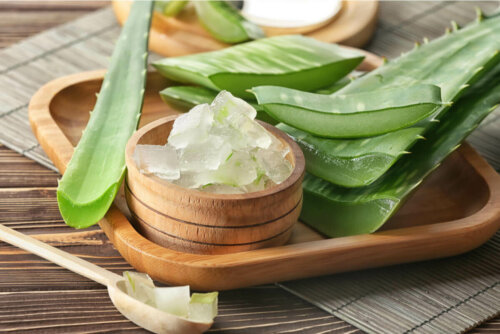Treatment for Cold Sores in Children

The appearance of cold sores in children can be worrying at first. These lesions are benign and tend to disappear on their own in a short time though. At least according to an article published in the National Center for Biotechnology Information.
As you may already know, the mouth is susceptible to a variety of conditions. Canker or cold sores are one of the most common. In fact, estimates indicate these affect up to 85% of people. So how do you treat them in children? Continue reading to find out.
Cold sores in children
The appearance of cold sores has to do with several factors but, in the case of children, these are attributed to their habit of putting things in their mouths. The lesions are inflammatory and cause pain.
They begin as an elevation in the oral mucosa, white in color, which may progress to an oval or circular ulcer. And, while they are shallow and clean-edged, their bottom can be necrotic and of variable diameter.
Generally, cold sores in children appear on the mucosa of the cheeks. However, they also tend to occur on the lips, tongue, and gums. This condition is more common in females than males for some unknown reason.
In addition, they can occur repeatedly over time. In this case, we say it’s a pathology referred to as “recurrent aphthous stomatitis.” It manifests through single or multiple lesions of various sizes.

Cold sores treatments
Regardless of whether the lesion is isolated or due to “recurrent aphthous stomatitis” it’ll usually disappear on its own in about 7 days. However, cold sores can be painful and sometimes hinder food intake.
This is why people often wonder if there’s something they can do to speed up the recovery process. There are two therapeutic options in this respect: a pharmacological one and one that consists of natural remedies. Both options are useful to improve the symptomatology and to avoid possible complications.
Pharmacological treatment
This is such a common condition, so it’s no wonder that there’s a wide range of drugs that help promote healing. Most of them are for topical use — they target the affected area. Here are some of the options currently available:
- Antiseptics such as chlorhexidine gel or mouthwashes attack the lesion-causing microorganisms
- Anti-inflammatories and topical corticoids enhance the action of antiseptics
- Antibiotics may be necessary if the oral infection is due to bacteria
Similarly, systemic treatment with oral steroids is a good idea in severe cases. The latter should be done under medical supervision and only when the cold sores are recurrent or overly symptomatic.
Check out these Six Remedies Against Cold Sores in Children
Natural treatments
Some natural remedies can serve as an adjunct to treat cold sores in children. While they’re not the first option, they can be helpful in reducing inflammation and fighting existing infections. Ideally, they should have anti-inflammatory and antiseptic properties, of course.
One of the most commonly used alternatives is to make a rinse using warm water with salt or baking soda. Repeat 2 to 3 times a day until you notice a significant improvement. The mixture should contain only a pinch of salt or baking soda mixed with half a glass of warm water. It’s not to be ingested.
Aloe vera is another ingredient commonly used for this purpose. The gel contained in the leaf has anti-inflammatory and antimicrobial properties that promote relief. It only requires a drop rubbed directly on the cold sore.

Read about Eight Natural Remedies that May Help Treat Canker Sores
How to prevent the appearance of cold sores in children?
At this point, it’s important to note that cold sores and “recurrent aphthous stomatitis” don’t have a specific cause in most cases. These lesions may appear due to some genetic predisposition or due to one of the following situations:
- Viral or bacterial infection
- Stress
- Vitamin deficiency
- Trauma from orthodontic treatments
- Hormonal changes
The prevention of cold sores in children should focus on the relief of the situations mentioned above. The main thing is for the little ones to maintain adequate oral hygiene. Thus, make sure they brush their teeth 3 times a day and use mouthwash at least once a day.
Consult your dentist if you suspect the colds are due to orthodontic treatment, even if the symptoms go away on their own. It’s also recommended for minors to take vitamin supplements, as well as food that contains vitamin B.
Some of them are:
- Leafy greens
- Fruit
- Dairy products
- Dry fruit and seeds
- Eggs
- Lean meats
- Whole-brain cereals
General considerations
Cold sores aren’t serious but can be rather annoying, especially in children. This is because they must limit their daily meals as these may lead to general discomfort.
Finally, the available treatments focus on reducing inflammation, eliminating pain, and promoting proper healing. In addition, you can prevent these injuries with adequate oral hygiene and the proper tools for it.
All cited sources were thoroughly reviewed by our team to ensure their quality, reliability, currency, and validity. The bibliography of this article was considered reliable and of academic or scientific accuracy.
- InformedHealth.org [Internet]. Cologne, Germany: Institute for Quality and Efficiency in Health Care (IQWiG); 2006-. Canker sores (mouth ulcers): Overview. 2019 Aug 15. Available from: https://www.ncbi.nlm.nih.gov/books/NBK546250/
- Babaee N, Zabihi E, Mohseni S, Moghadamnia AA. Evaluation of the therapeutic effects of Aloe vera gel on minor recurrent aphthous stomatitis. Dent Res J (Isfahan). 2012;9(4):381-385.
- Córdoba M. Aftas recurrentes en niños y adolescentes. Revista de la Sociedad Odontológica de La Plata. 2018;20(56):19-22.
- Schemel Suárez M, López López J, Chimenos Küstner E. Úlceras orales: diagnóstico diferencial y tratamiento. Medicina Clínica. 2015;145(11):499-503.
- Pérez A, Rodríguez P. Tratamiento de la estomatitis aftosa recurrente. Medicentro. 2012;16(1):1-10.
- Marinovic M. Aftas orales recurrentes: diagnóstico diferencial y manejo. Medwave. 2009;9(2):e3773.
- Falgás Franco J. Patología bucal. Pediatriaintegral.es. 2015. Available from: https://www.pediatriaintegral.es/publicacion-2015-01/patologia-bucal/
- Bonet R, Garrote A. Aftas bucales. Farmacia Profesional. 2015;29(1):27-31.
- MacDonald J. Canker sore remedies: baking soda. CMAJ. 2002;166(7):884.
This text is provided for informational purposes only and does not replace consultation with a professional. If in doubt, consult your specialist.








